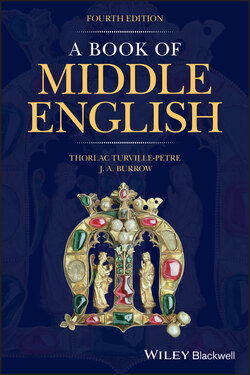Читать книгу A Book of Middle English - J. A. Burrow - Страница 21
2.2.3 Unstressed Final ‐e
ОглавлениеIn the spelling of modern words such as ‘name’, ‘fine’ and ‘nice’, the final letter ‐e serves to define the sound of the previous vowel and often also that of the intervening consonant. In Middle English spelling, however, it had a more straightforward function: to indicate a final e sound. Sometimes it represents the sound /e:/, in which case it is distinguished in this book by an acute accent (pité, pronounced /pite:/). But its main function was to represent the unstressed final /ǝ/, as in the second syllable of modern ‘China’. Thus, in the poetry of Gower, a word such as name will have two syllables, /na:mǝ/, except where the final vowel is lost before a following word which begins with a vowel or some kinds of h‐ (see 6.2 below). There was, however, a tendency for /ǝ/ to be lost in such unstressed positions, especially in more northerly dialects. Hence the rhymes of the Gawain‐poet indicate a northerly usage varying between pronounced and silent final ‐e: compare the rhymes in 9/176, 178 and 9/413, 415 here.
